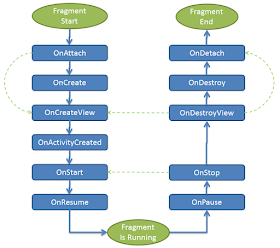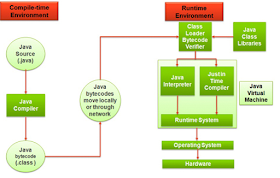Hello guys, if you are preparing for an Android app developer interview and
looking for some Android interview questions then you have come to the right
place. Earlier, I have shared
free Android courses for beginners, and in this article, we will explore some of the most frequently asked
Android interviews questions. Android is very hot nowadays as its one of the
top operating systems for mobile and smartphones and a close rival to Apple's
iOS. Android application developer job is in demand as well. I have also seen
a couple of
Java questions
in an Android interview as well. It means it's better to prepare some Java
questions as well.
These Android Interview Questions are very basic in nature but appear
frequently on beginners or Intermediate programmer levels on various Android
interviews. Earlier, I have not provided answers to this question but
now I have updated most of them.
These questions are good for recap and practice before going to the Android
interview. If needed I am also thinking to add more Android interview
questions with answers in this article, depending upon feedback, if you want
you can also contribute Android interview questions asked to you, even if you
don't know the answers.
Exploring interview questions is also a good way to learn Android in-depth as
it encourages you to research more and on the way you learn subtle
things.
Btw, if you are new to Android or haven't touched Android for a long time, I
suggest you join an up-to-date hands-on course like The Complete Android Oreo Developer Course - Build 23 Apps!
on Udemy. It's a good course to learn and revise essential Android
concepts.
10 Android Interview Questions answers for Java Developers
Here is a couple of interview questions from the Android operating system, It is collected from various telephonic and face-to-face interviews. Any Java programmer can use it to prepare for the Android interview.Question 1: What is the difference between a regular .png and a nine-patch image?
Answer: This is one of the most popular Android Interview questions, asked in
several interviews ranging from 1 to 2 years of experience to 5 years. The
answer is, It is a resizable bitmap resource that can be used for backgrounds
or other images on the device.
The NinePatch class permits drawing a bitmap in nine sections. The nine patch images have an extension as.9.png. It allows an extension in 9 ways like 4 corners that are unscaled, 4 edges that are scaled in 1 axis, and the middle one that can be scaled into both axes.
Question 2: What is an ANR notification in Android?
The NinePatch class permits drawing a bitmap in nine sections. The nine patch images have an extension as.9.png. It allows an extension in 9 ways like 4 corners that are unscaled, 4 edges that are scaled in 1 axis, and the middle one that can be scaled into both axes.
Question 2: What is an ANR notification in Android?
Answer: ANR is short for Application Not Responding. Android systems show this
dialog if the application is performing too much of a task on the main thread
and have been unresponsive for a long period of time.
Question 5: What is an action in Android?
Question 3: How to share content using Android Share Intent?
Share intent is an easy and convenient way of sharing the content of your
application with other apps.
Question 4: When does the onResume() method call?
Another frequently asked android interview question. onResume() method is
an activity lifecycle method. This is called when the activity comes to
the foreground. You can override this method in your activity to execute
code when the activity is started, restarted, or comes to the
foreground.
You can further join the
Android Java Masterclass - Become an App Developer course
on Udemy to learn more about the life-cycle of events in Android. It's a
great course to learn Android for Java developers.
Here is a nice diagram that explains the sequence of different callback methods in Android, including onResume():
Here is a nice diagram that explains the sequence of different callback methods in Android, including onResume():
Question 5: What is an action in Android?
A description of something that an Intent sender desires is called Action in
Android.
Question 6: What is the difference between an implicit intent and explicit intent?
Question 6: What is the difference between an implicit intent and explicit intent?
There are two types of Intent implicit and explicit intent, let's see some
more differences between them.
1. implicit:
Implicit intent when you call system default intent like send an email, send SMS, dial number, etc
like.:
2. Explicit:-
Explicit intent when you call you're on application activity from one activity to another
e.g. first activity to second activity
Question 7: What is the APK format?
1. implicit:
Implicit intent when you call system default intent like send an email, send SMS, dial number, etc
like.:
Intent sendIntent = new Intent(); sendIntent.setAction(Intent.ACTION_SEND); sendIntent.putExtra(Intent.EXTRA_TEXT, textMessage); sendIntent.setType("text/plain") startactivity(sendIntent);
2. Explicit:-
Explicit intent when you call you're on application activity from one activity to another
e.g. first activity to second activity
Intent intent = new Intent(first.this, second.class); startactivity(intent);You can also join the Understanding Android Application Basics course on Pluralsight to learn more about Implicit and Explicit Intent. It's one of the best online courses to learn Android basics and how to create awesome Android applications using Activities on Android.
Question 7: What is the APK format?
The APK file is a compressed AndroidManifest.XML file with extension.apk,
Which has application code (.dex files), resource files, and other files
that are compressed into a single .apk file.
Question 8: What is the Dalvik Virtual Machine?
Question 8: What is the Dalvik Virtual Machine?
Just like Java application run on Oracle HotSpot JVM or Azul JVM,
Android application runs on the Dalvik Virtual Machine.
Question 9: How Android app runs on Android mobile? (answer)
Question 9: How Android app runs on Android mobile? (answer)
Since Android code is written in Java, they are also compiled first and then
executed, but the JVM for which the bytecodes are generated is different than
standard JVM. The Dalvik JVM is used to run the Android app. See the answer
for a more detailed discussion.
You can also join the Modern Android App Development with Java, an interactive course on Educative to learn more about Android app
development using Java Programming language. It's a text-based interactive
course where you can learn Android without getting stuck on the setup as you
can run code right on your browser online.
More Android Questions for Practice
Here are some more frequently asked Android Interview questions for Java Programmers:1. What is Android? is it an Operating System or programming language?
2. Which programming language is used to develop an application for Android?
3. Which devices have you worked on on the Android platform?
You can name any device you have worked like Samsung Galaxy S5 or any other
model but be prepared from some follow-up questions like which Android version
those devices support. So, only tell the device where you have worked or have
good knowledge to answer follow-up questions.
4. What best practices do you follow to ensure that your application work on multiple Android devices of different screen size, processing power, and features?
5. What is Activity and Intent in Android? What is the difference between Activity and Intent?
6. What kind of application have you developed on the Android platform? Games, applications?
7. What is the Android manifest file? Why do you need this?
8. How do you implement Internationalization and Localization in an Android application?
4. What best practices do you follow to ensure that your application work on multiple Android devices of different screen size, processing power, and features?
5. What is Activity and Intent in Android? What is the difference between Activity and Intent?
6. What kind of application have you developed on the Android platform? Games, applications?
7. What is the Android manifest file? Why do you need this?
8. How do you implement Internationalization and Localization in an Android application?
9. How do you find the IMEI and IMSI number of an Android device
During a developer interview, when asked about finding the IMEI (International Mobile Equipment Identity) and IMSI (International Mobile Subscriber Identity) numbers of an Android device, it's crucial to demonstrate a solid understanding of Android development and mobile technologies.
You can mention using Android's built-in APIs, such as TelephonyManager, to programmatically retrieve these identifiers. Highlight the importance of requesting appropriate permissions from the user to access this sensitive information, as it relates to privacy and security.
Additionally, showcasing an awareness of best practices, such as securely handling and transmitting these identifiers, reflects a responsible and capable developer who respects user data and maintains app integrity.
If you have faced any interesting Android Questions or looking for the answer to any tricky Java question or Android question then you can share with us as well.
Other Interview Question articles You may like
- 10 Java tough interview questions – Answered
- 10 Tricky Questions asked in Java Interview – Answered
- 10 Java design pattern Interview Questions
- Top Java Collection Interview Questions – Answered
- Java Web Service Interview Questions – SOAP vs REST
- Spring MVC Interview Questions - FAQ
- 20 Spring and REST Interview Questions
- 75 Coding Questions to Crack Any Programming Interview
- 100+ Data Structure and Algorithm Questions
- 10 Courses to learn Java for Beginners
- My Favorite books to learn Java Programming in depth


Can you please share answer of remaining Android Interview question, also it would be fantastic if share some more Android Interview question for 1 year and 2 year experience Android developers. I have experience in J2ME and programming in Android from 2 years.
ReplyDeleteI have 8 years of exp in mobile application development, which includes c, brew, and android. I am working as technical lead in Samsung. Thanks for sharing good questions.
ReplyDeleteCouple of Android questions from my side :
ReplyDeleteWhat is difference between Android and J2ME?
What is difference between Android and Symbian or Windows Mobile?
Can you code in Java 8 for Android application? If no, why not?
What is difference between byte code generated by javac and android ?
Can you please share some Android questions for freshers and 1 year experience? I have done some Android programming for my own projects, which Android topics should I prepared to do well? Does knowing Java is enough for getting Android job? Also what is the difference between Android questions for say 1 year experience or 2 to 3 year experience guy? which topic they asked more on each interview?
ReplyDeletepublic class MainActivity extends ListActivity {
ReplyDeleteListView mListView;
ArrayList mRoutesList;
RoutesAdapter mRoutesAdapter;
@Override
protected void onCreate(Bundle savedInstanceState) {
super.onCreate(savedInstanceState);
init();
new ThreadWorker(this,new RouteHandler()).execute((Object[]) null);
mListView.setOnItemClickListener(new AdapterView.OnItemClickListener() {
@Override
public void onItemClick(AdapterView parent, View view, int position, long id) {
Intent intent = new Intent(MainActivity.this,RouteDetails.class);
intent.putExtra("route",mRoutesList.get(position));
startActivity(intent);
}
});
}
private void init() {
mListView = getListView();
mRoutesList = new ArrayList();
mRoutesAdapter = new RoutesAdapter(this,mRoutesList);
mListView.setAdapter(mRoutesAdapter);
}
class RouteHandler extends Handler{
@Override
public void handleMessage(Message msg) {
super.handleMessage(msg);
ArrayList routes = (ArrayList) msg.obj;
mRoutesList.addAll(routes);
mRoutesAdapter.notifyDataSetChanged();
}
}
}